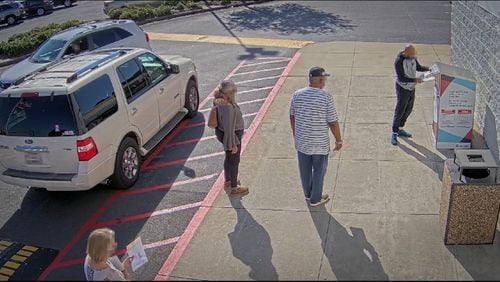False accusations of voter fraud smeared an Atlanta-area auditor who was shown in the conspiracy movie “2000 Mules” when he legally delivered five absentee ballots for his family, his lawyers said in federal court Thursday.
A federal judge considered the defamation lawsuit hours before Donald Trump, who has said he would use the movie in his defense against racketeering charges, turned himself in 4 miles away at the Fulton County Jail.
The lawsuit by Mark Andrews says “2000 Mules” damaged his reputation and intimidated him by using a clip from surveillance video as the narrator says: “What you are seeing is a crime. These are fraudulent votes.”
A state investigation found that Andrews followed Georgia law when he delivered ballots for his three adult children, his wife and himself. State law allows voters, family members or caregivers of disabled voters to drop off ballots.
U.S. District Judge Steven Grimberg questioned why it was permissible for the movie to publicly accuse Andrews of breaking the law.
“Mr. Andrews was just voting. He’s not a candidate. He’s not a celebrity,” Grimberg said. “... The narrator didn’t say, ‘I think this is a crime.’ The narrator said, ‘What you’re watching is a crime.’ ”
Attorneys for the defendants, which include conservative moviemaker Dinesh D’Souza and True the Vote, said they were stating an opinion that’s protected by the First Amendment’s freedom of speech protections.
“The film is opinion, based on disclosed facts,” said Joseph Larsen, who represents True the Vote, a Texas-based organization that collaborated on the movie. “The premise of the movie is that you can’t trust the government to begin with.”
The movie blurred Andrews’ face as he deposited his family’s absentee ballots into a drop box in Gwinnett County before the 2020 election, but the lawsuit said he was still identifiable.
Lea Haber Kuck, an attorney for Andrews, said there’s no constitutional protection against defamation by a film that profited from his image without his permission.
“There’s no law that says you can blur someone’s face and do whatever you want,” Kuck said. “He and his wife watched the movie and they were very upset about it and feared for their safety.”
The movie is still available for purchase online, and Andrews’ image was also used in the “2000 Mules” book that was released after the State Election Board cleared him of wrongdoing in May 2022.
Catherine Engelbrecht, the co-founder of True the Vote, attended the hearing along with her colleague Gregg Phillips, both of whom gathered video and information for the movie.
“We were figuring out how we could possibly take a measured look at what was going on with the drop boxes, and we just talked about how do you bring down a cartel?” Engelbrecht said in a video released this week.
The State Election Board recently sued True the Vote over its unwillingness to comply with subpoenas that would support its allegations of the “2000 Mules” ballot collection scheme.
Grimberg, a Trump appointee, said he hopes to rule within 45 days on motions to dismiss by the defendants.
If he rules against the dismissal motions, the case could move forward with gathering evidence and a trial.
About the Author








